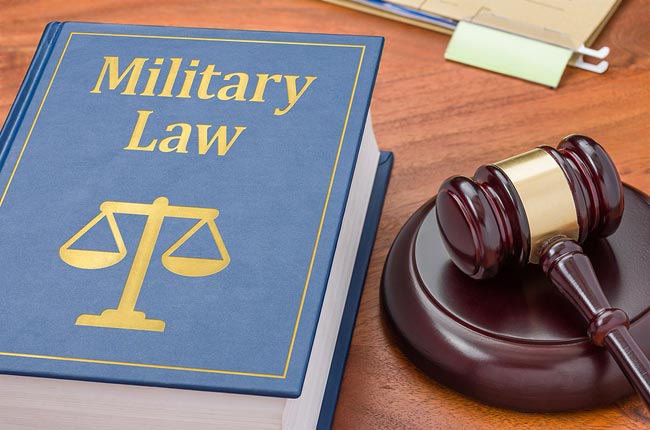Military Law
Aggressive Legal Representation in Military Matters Pertaining to Court Martials, Administrative Separation Proceedings, Physical Evaluation Boards and the U.S. Court of Military Appeals in the Roanoke - Bedford, Va Region
Court martial, administrative separation proceedings, physical evaluation boards, and applications to the Boards for Correction and Discharge Review Boards are all part of military practice. As a retired Navy Officer, attorney J.B. Thomas brings 20 years of military law experience to the table.
What Is Military Law?
Military Law in the United States, is a term used to designate the body of statutes, rules, and regulations governing military personnel and also certain civilians during wartime. Unlike martial law, which applies to all persons and property in the district in which it prevails, military law in peacetime applies to military personnel alone. Military law differs from military government in that the latter refers particularly to the military jurisdiction exercised by an army of occupation over the territory and inhabitants of an enemy country.
The basis of the military law of the United States is contained in Article 1, Section 8, of the U.S. Constitution, by which Congress is empowered "to make rules for the government and regulation of the land and naval forces"; the law is embodied in the Uniform Code of Military Justice, which became effective in 1951.
The statutes of military law establish systems of military courts and include penal codes defining the offenses for which persons subject to the code may be punished. Such offenses include mutiny, insubordination, neglect of duty, unbecoming conduct, theft, robbery, rape, and murder. Military personnel charged with crimes of a civil nature may be tried by military courts if the crime is service-connected or of military significance, or if it occurs outside the United States or its possessions.
Similarly, military personnel are subject to trial by civil courts if they commit a civil offense.Punishments vary according to the nature of the offense and range from restriction within certain limits, confinement, loss of pay, or reprimand, to the death penalty for such offenses as murder, treason, and desertion in time of war. Trials before military courts are conducted without a grand jury or a petit jury; for the composition and operation of such courts.
What Is The U.S. Court of Appeals for The Armed Forces?
The United States Court of Military Appeals, which was re-designated on October 5, 1994 as the United States Court of Appeals for the Armed Forces by the National Defense Authorization Act for 1995. Thus, this Federal Court is established under Article I of the Constitution which gives to Congress the power to make rules for the government and regulation of the armed forces. The court was designed to insure a military judicial system which balanced the need to maintain discipline in the armed forces and the desire to give to service members accused of crime rights paralleling as nearly as possible the rights enjoyed by accused persons in the civilian community.

Discuss Your Case
If you are interested in discussing your military law case, request help by filling out and submitting a client information form. You will be contacted by a staff member within 24 business hours.
Helpful Military Law Resources
Service Members Legal Defense Network - The sole national legal aid and watchdog organization that assists service members hurt by the Don't Ask, Don't Tell, Don't Pursue policy.
Legal Information Institute - In-depth review of U.S. Code: Title 10 Armed Forces for general military law pertaining to each branch of the service.
U.S. Army Judge Advocate General Web site - Legal branch Web site for the U.S. Army.
Where Larger Firms May Treat You
Like a Number, We Give Your Case a
Personal Touch!
For over two decades, JB Thomas has served those who call Virginia their home. In April of 2016, however, he and J. Aaron Thomas (father and son) partnered together in an effort to distance themselves from the impersonal nature common in larger firms and to return the emphasis of legal counsel to where it belongs--on the client.
Thomas & Thomas Law, PLLC provides courtroom representation for individuals, military personnel, and small businesses, and delivers quality service at affordable rates, with low down payments and payment plans for legal services.
Getting Here

Virginia Cities - Towns We Serve
Serving All of Southwest & Central Virginia
All Rights Reserved
Legal Disclaimer - The Thomas & Thomas Law Firm, PLLC is registered as a Professional Corporation in the Commonwealth of Virginia. The information provided in this web site is offered for informational purposes only. It is not offered as and does not constitute legal advice. The Thomas & Thomas Law Firm, PLLC does not seek to represent you based upon your visit or review of this web site alone. The web site may be considered advertising under the rules of the Commonwealth of Virginia. You should not make legal hiring decisions based upon brochures, advertising, or other promotional materials. CLICK HEREto read our Privacy Statement and Legal Disclaimer.
